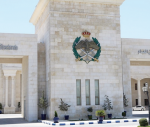You are here
The twin challenges of teamwork and management of difference
Apr 19,2018 - Last updated at Apr 19,2018
Several problems cripple work and impede progress in our society, at both the formal and informal levels. Among them are teamwork and management of difference.
Overall, people in our society do better in individual work than in team work. This can be clearly reflected in sports, for example, as our athletes seem to achieve better results individually than within teams.
The first Olympic gold medal for the country was obtained by one solo athlete, and his brilliant coach, and not by a team.
The same can be said about performance in nearly all other spheres. One of the clearest examples is committee work, where the majority either relies on one or two persons to do the work, or when one or two persons dominate and silence everyone else.
This is totally unhealthy, and the ultimate result is that as a society, and not just as individual institutions, we lag behind, and often, fail in collective performance.
Politically, the failure of the Arab World to build consensus and reap successful results with respect to many bilateral and multilateral issues, at both the Arab and international levels, may be attributed to the exact same cause: inability to coordinate, build consensus and act collectively.
While such a phenomenon is both vexing and damaging, it is understandable.
Several people, in fact, refer the problem to the absence in both our upbringing and schooling of emphasis on collective performance.
In our schools, for instance, teamwork as a teachable/learnable and then testable/measurable skill is still largely absent, unlike in many other countries where teamwork lies at the heart of early and advanced schooling.
In a conference which I attended in Lisbon a few years ago, European education experts put teamwork among the first four top skills for both school and university graduates.
We could, and should, do the same.
And we do not fare better with management of difference, which is the other major problem.
Difference is a fact of life. Individuals, even within the same family, differ not only in shape, colour and size, but also in taste for food and clothes, in tone of voice, in work and study habits, in private and public conduct and in political and ideological stands.
This is natural, and is supposed to be nourished, encouraged and then aptly managed and capitalised upon.
As things stand, however, difference in our society at nearly all the levels spoken of is neither amply tolerated, nor aptly recognised, encouraged and managed.
Again, we see the failure to embrace and manage difference in nearly all spheres, among which is group work in formal and informal contexts, where many individuals are suppressed and silenced: in family, in the classroom, in public seminars, in committees and in institutions.
In most of our institutions, dealing with difference is a huge challenge. In the absence of ways and means of embracing, channeling, and managing difference positively a lot of bickering, back-biting, friction, tension, verbal abuse, and at times pushing and shoving goes on.
And this poisons the work environment, subverts creativity and impedes the normal flow of work.
At the pan-Arab level, the fighting that goes on in and among many Arab countries can be attributed to this very factor: failure to manage difference.
Again, we need to do a lot in this respect at the educational level, where we can and should from the start nourish, nurture, embrace difference, and then enable students, teachers and administrators to manage difference, as management of difference is also a skill.
The twin challenges of teamwork and management of difference need to be addressed head on, and at all the necessary levels, if our society is to proceed peacefully, smoothly and steadily towards development and progress.













